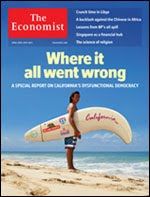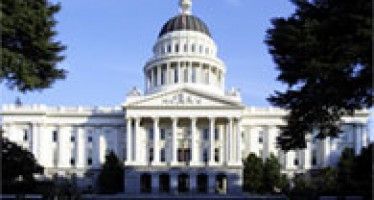The Economist Mag Assaults Prop. 13
By K. Lloyd Billingsley
The surfer, posed by what appears to be the Pacific Ocean, wears star-spangled trunks and his surfboard bears a peace sign, a highway placard bearing the number 13 and a banner reading “Direct Democracy.” The section of his board emblazoned “California” is bent, like a failed design for a boomerang, and pointing downward. In case you Don’t Get the Imagery, the headline of The Economist magazine (April 23-29 issue) explains: “Where it all went wrong: A special report on California’s dysfunctional democracy.”
This is indeed one whopper of a cover story, but not exactly in the way The Economist intends. They even promote it in a “leader” (editorial) headlined “The perils of extreme democracy: California offers a warning to voters all over the world.” This charts some California woes such as the worst credit rating among the 50 states, and wonders how a state with so much going for it can be so poorly governed.
“It is tempting to accuse those doing the governing,” the editorial says. California legislators are “a pretty rum bunch,” and second-chance governor Jerry Brown has “struggled to make the executive branch work.” But “the main culprit has been direct democracy,” as the special section, “Democracy in California: The People’s Will,” argues. That claim also requires some investigation, even though direct democracy does get a workout.
The special report provides background on the Greeks, ancient Athens and the founders of the United States. Direct democracy in California, however, is not quite the same. It was to counter the mighty Southern Pacific Railroad, which bestrode the state like a colossus. “Direct democracy in California is thus an aberration…. Instead it encourages special interests to wage war by ballot measure until one lobby prevails and imposes its will on all.” But not so fast.
To correct gerrymandering “the initiative process, in this case, may prove to have done some good.” So direct democracy can be beneficial after all. The report might have mentioned Proposition 209 (1996), which curbed institutional discrimination by eliminating race, ethnic and gender preferences in state employment, education and contracting. Or Proposition 227 (1998), which dumped failed bilingual education programs.
The report contends that James Madison, et al., would not recognize California-style democracy, lacking in checks and balances. This ignores the courts. Whatever one thinks of Proposition 187 (1994), which eliminated many benefits for undocumented persons, voters passed it handily but the courts nixed virtually all of it. Proposition 63 (1986) declared English the official language of California and 73.2 percent of voters, including many of Iberian descent, passed it. The Ninth Circuit declared the vote “largely symbolic” and the U.S. Supreme Court reversed that ruling.
Attacking Prop. 13
So checks and balances exist, and initiatives can do some good. The villain of this special report is not direct democracy but an “unprecedented initiative that shapes the state to this day: Proposition 13.” The report notes that Prop. 13 cut the property tax rate from an average of 2.6 percent of a property’s value to 1 percent, and required a two-thirds supermajority in the Legislature for any tax hike. The report does not note that, prior to Prop. 13, some Californians were literally taxed out of their homes while the state was running a surplus.
Gov. Jerry Brown opposed Prop. 13 with an apocalyptic zeal that would have put Al Gore to shame. The report says Brown “tried to make a cerebral case for an alternate initiative,” implying that Prop. 13 was visceral and stupid. Then Brown “made a stunning U-turn” to endorse the initiative. He does not note that Brown declared himself a “born-again tax cutter” and, as a presidential candidate, even promoted a flat tax.
The special report charges that Prop. 13 launched an orgy of initiatives “from environmentalists and potheads to evangelical Christians and Indian tribes, from insurers to oil and tobacco companies.” It did cut property taxes for homeowners and put some restraints on the Legislature, but the report neglects to outline what this supposedly all-powerful initiative did not do.
Political activist Lenny Goldberg told The Economist that Prop. 13 centralizes “virtually all finance in Sacramento,” but that is debatable. The measure had nothing to say about state distribution of money. More important, Prop. 13 did not mandate any state spending and certainly no spending beyond state revenues.
Prop. 13 did not create any new government agencies. Curiously, Proposition 71, the 2004 state stem cell bond initiative, did precisely that, creating the California Institute of Regenerative Medicine, funded with more than $3 billion in state money but providing none of the promised medical cures and therapies. The Economist’s report does not mention Prop. 71, nor Proposition 20, which created the California Coastal Commission, an unelected body with vast powers and staffed by zealots.
Collective Bargaining
Prop. 13 did not authorized government employee unions for California, nor collective bargaining with the state. Jerry Brown did that in his first stint as governor by signing the Dills Act. Prop. 13 did not impose any onerous regulations based on bad science, such as AB 32, the Global Warming Solutions Act of 2006. The proposition did not mandate any new state hires and did not approve pay raises for California legislators.
Prop. 13 did not authorize state employees to retire in their 50s with most of their salary for life, nor did it spike any pensions. Prop. 13 did not approve welfare cards that can be redeemed at casinos and on cruise ships. Prop. 13 did not attempt to tax editorial cartoons as though they were works of art purchased in an art gallery, as in the 1996 “laugh tax” that made California a national joke. All that came through legislators and unelected bureaucrats.
Prop. 13 did not mandate that California bulk up the state to consume more than 20 percent of the state economy, about twice the amount that best facilitates economic growth. Prop. 13 did not set a top income-tax rate of 10.55 percent, one of the highest in the country, and a second-highest rate of 9.55 that kicks in at $47,055. “Those doing the governing” did that –legislators. The report acknowledges that the tax system is volatile, but reserves its wrath for Prop. 13, which did not mandate term limits either.
The Economist believes Prop. 13 wrecked California education. The figures cited understate education spending and the special report does not note that, in California’s government monopoly K-12 system, such spending must trickle down through four layers of bureaucratic sediment. Long before Prop. 13, the system was a vast collective farm of ignorance and mediocrity.
The special report’s main source on this theme is John Mockler, billed as an “expert in California education,” ergo, an outside, objective observer. This is like describing former Assembly Speaker Fabian Nunez as an “expert in California government.” Mockler is an insider’s insider and strident apologist for the system, from which he has drawn considerable profit.
Mockler served as a consultant to the Assembly Education Committee in 1965 and went on to advise Assembly Speaker Willie Brown and to work for former state Superintendent of Public Instruction Wilson Riles. As president of the lobbying firm Strategic Education Services in Sacramento, Mockler did a fine job channeling countless millions in state funds to the clients he represented. These include the Association of American Publishers, who lobby furiously to sell their overpriced and often deficient textbooks.
A lucrative lobbyist career did not prevent Gov. Gray Davis from hiring Mockler as executive director of the State Board of Education. This was after, as the report notes, the California Teachers Association, “the largest spender in California politics,” hired Mockler to write Proposition 98, which unlike Proposition 13, does indeed mandate spending.
California Crackup
Another major source for the special report is “California Crackup: How Reform Broke the Golden State and How We Can Fix It,” by Joe Mathews and Mark Paul, a classic of anti-Prop 13 demonology. The authors want to restrict the initiative system but add more legislators. In similar style, the report wants California to “re-invest the legislature with the credibility it once had.” The report wants a bigger Legislature, and a unicameral model, like Nebraska’s.
In the end, The Economist seems to understand that propositions, like laws, are a mixed bag. “The problem is not direct democracy as such but the details of its California variant. It needs to be fixed, not eliminated.” Further, California might see the “liveliest debate about freedom and governance since the Federalists and anti-Federalists,” with “lessons for everyone.”
Unlike most pieces in The Economist, a publication of high reputation whose authors mostly are anonymous, at least readers know who wrote this piece on California. The author is Andreas Kluth, who writes their other California pieces, and who speaks three languages. He’s obviously a smart fellow, but as Saul Bellow wrote, “a great deal of intelligence can be invested in ignorance when the need for illusion is deep.”
Kluth’s special report is indeed a cover story, ignoring California’s main problems, and maintaining the illusion that Prop. 13 is to blame. As long as that illusion prevails, the prospects for meaningful reform remain dim. Californians would be better off following The Economist’s editorial. The Golden State has a lot going for it but remains “so poorly governed.” Better, then, to accuse those doing the governing. As the The Economist says, they’re a “pretty rum bunch.”
Related Articles
In same spirit as ‘courtesy flush,’ ‘courtesy vote’
March 18, 2013 By Chris Reed The fact that on March 6 a member of the bullet train’s board of
Vacancies trigger 2015 state Senate elections
The Nov. 4 vote didn’t end this election cycle, but sparked a new round. Three sitting state senators won seats in
CA considers state pot bank
Grappling with the regulatory challenges faced by liberalizing marijuana laws, California officials floated the idea of a state-run bank for





